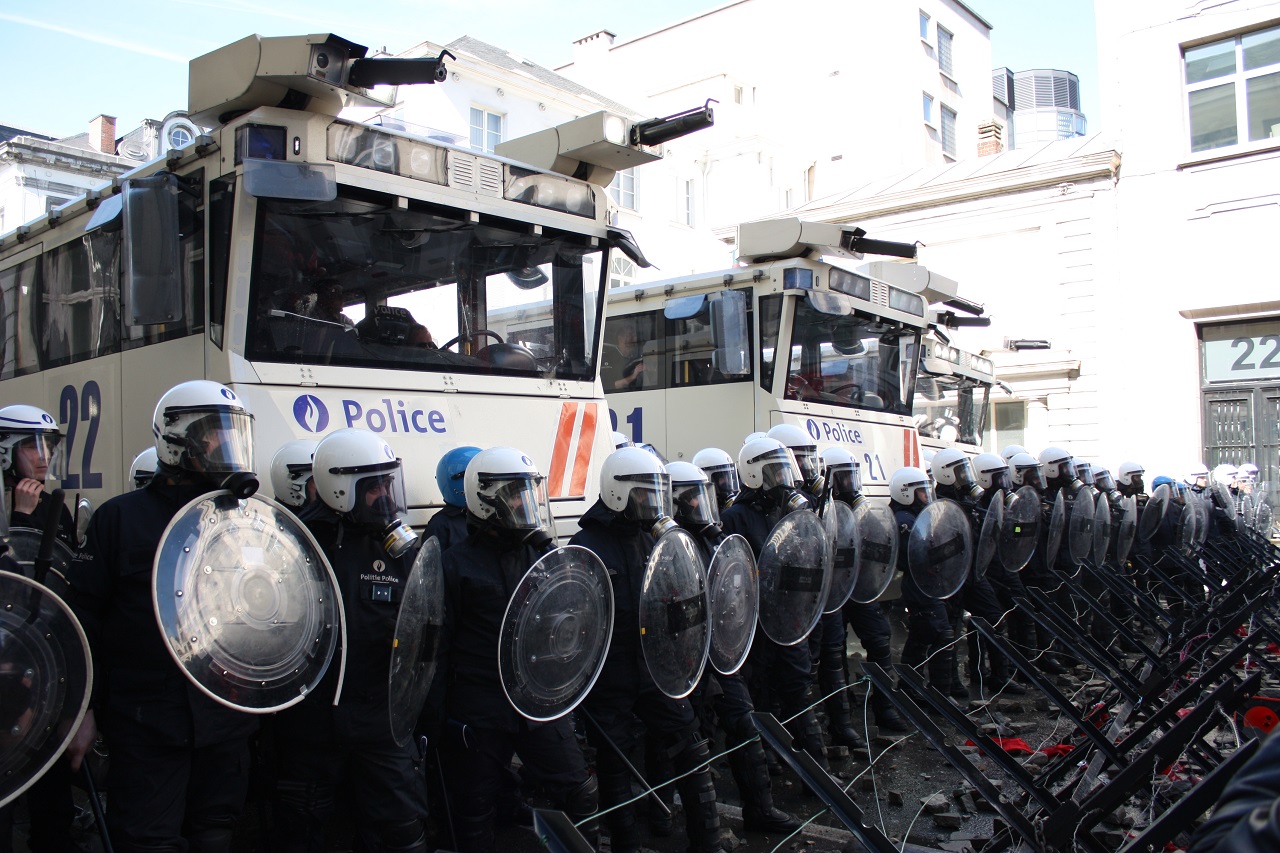The Brussels Attacks: How Should Europe Respond? Dr. Jarvis spoke with Reza Akhlaghi from Foreign Policy Concepts, to talk about this week’s terrorist attacks in Brussels.
In the age of indiscriminate and unbridled violence, the latest attacks in Brussels are yet another clear demonstration of our inability to prevent mass killings in public places. Do you agree with this assessment?
In one sense, yes. I think the events in Brussels are an important reminder that the idea of complete, total or permanent security is only an idea and that we might have to learn to live better with risks such as this. Counter-terrorism is fiendishly difficult: in part because of an inevitable limitation of resources, but also because its target – those we identify as ‘terrorist’ – is made up of thinking, calculating individuals who learn from the past and respond to the actions of those who would stop them. It is also difficult because counter-terrorism professionals have to manage other priorities alongside national security. These include, amongst others, vitally important tasks such as reassuring publics, working within the rule of law and maintaining civil liberties.
At the same time, it is vital to bear in mind that the statistical threat posed by terrorism is – by any objective measure – minimal. This is especially the case for those of us fortunate to live in the global South. In relative terms, numerous studies have compared this threat to the greater risk of death or injury from far more mundane sources of harm: traffic accidents, crime, DIY accidents, diseases, and so forth. The type of event we have witnessed in Brussels is therefore newsworthy because it is so dramatic and so rare—mass casualty terrorism is a particularly unusual phenomenon—however awful for those immediately affected. We should remember, then, that citizens in much of the world today enjoy more security, higher life expectancies, and better quality of life than their equivalents at any time in history. We have, in a sense, never been more secure.
What is your definition of a measured response to Tuesday’s terror attacks? Can you elaborate on different aspects of a measured response?
I mean several things by this.
First, is to avoid the temptation to a rushed judgment on the perpetrators behind the attacks and their motivations. Although Islamic State or Daesh appears to have claimed responsibility, this is – as I write – yet to be verified. The history of terrorism is replete with examples of misattributed or falsely claimed attacks, and it is wise, I think, to suspend judgment until further information is known. On top of this, claims of responsibility – even if genuine – are not necessarily as straightforward as they sometimes seem. Contemporary militant groups often do not have an identifiable chain of command stretching from leader to ‘foot soldier’. That is why some people speak of groups like al Qaeda and perhaps also Islamic State as a ‘brand’ rather than a coherent organization: something that is bought into by a self-identifying member.
Second, is that we need to respond with moderation, prudence and patience. Counter-terrorism initiatives are often rushed through in response to very unusual events such as Tuesday’s attacks (for understandable reasons), which has obvious implications for their effectiveness. Moreover, there is a real danger that counter-terrorism efforts to increase security can be counter-productive and cause more harm than good. This is particularly the case when communities are targeted for especial attention because of their apparent connection to an attack. In some work I conducted with Dr. Michael Lister of Oxford Brookes University, UK, we found that many individuals in the UK felt personally targeted and even threatened by the UK’s responses to terrorism, and that their citizenship had become, as a result, far more precarious.
More generally, excessive responses to terrorism risk dramatically curtailing established and important civil liberties such as rights to movement, speech and assembly. And militaristic responses, finally, obviously risk the ‘collateral damage’ of civilian casualties as we have seen with strikes in Syria, Iraq, Pakistan, Afghanistan and beyond in recent years.
Molenbeek, the neighborhood where two of the attacks took place, is a microcosm of multiple communities that have constructed their own sense of identities free from Belgian national identity. Can there be a socio-cultural response to these attacks in Europe?
It depends on what you mean by socio-cultural response. I am wary of so-called counter-radicalization initiatives such as the Prevent strategy, in the UK, which seek to intervene at an early stage on individual’s ‘journey’ toward terrorism. Such initiatives rely upon a tenuous idea that the pathway toward terrorism is a linear and unidirectional one, conveying a person from ordinary citizen to bloodthirsty terrorist. Such an understanding is simply not borne out in any serious academic research. They are also frequently policed by teachers, doctors, and so forth who will likely have limited competence in identifying ‘risky’ individuals, and more important and pressing tasks of their own to be conducting.
Moreover, discussions about radicalization are almost uniformly applied toward minority communities, and Muslims in particular. They risk conflating community cohesion with security policy: reducing the former to an instrument for the latter rather than something worthy of attention in its own right. And, they frequently verge on the illiberal in seeking to ‘flag up’ ‘radical’ ideas or behavior and thereby circumscribing the space available for protest, dissent and disagreement.
If, on the other hand, the term refers to opening opportunities to listen, debate and respond to the grievances, fears and injustices that might create an environment conducive to violence such as those in Brussels, then I think there is an important role for such initiatives. Especially, if this is seen as an alternative to more exceptional forms of counter-terrorism policy.
You’ve recently suggested that the attacks in Brussels be looked at as criminal rather than military, and that we should “prioritize responses grounded in criminal justice, intelligence and diplomatic frameworks rather than those reliant upon armed forces”. What do you mean by that?
At a very basic level, how we frame a problem has implications for how we respond to it. If I understand ordinary crime such as theft as a problem of poverty or inequality, I am likely to be in favour of a different type of response than if I see such crimes as a product of greedy or lazy individuals.
In the case of terrorism, three common registers are used in problematisations of this issue. First is a desire to treat terrorism as a military threat or form of war. This is likely to lead to militaristic responses such as assassinations or ‘wars on terror’. Second is to see terrorism as a criminal activity and, therefore, respond to it via the criminal justice framework. Third approach to terrorism is akin to a ‘disease’: a symptom of underlying causes such as injustice or inequality.
Each of these conceptions has its merits, but my concern is with the contemporary reliance upon military power to counter terrorism. Such a reliance has, arguably, increased terrorism around the world since the 9/11 attacks – we need to look no further than the emergence of Islamic State in Iraq for evidence of this. It has also caused considerable human harm in the case of civilian casualties, displaced persons and so forth. For this reason, I think it is important to think more carefully about the contexts or conditions in which terrorism thrives, and to respond through ‘normal’ political processes such as criminal trials and even diplomacy or negotiation. Such measures have, in my view, a far more sound historical success rate than the use of hard military power, and have been employed in numerous situations around the world: Northern Ireland, Spain, and beyond.
The great success in the execution of the attacks in Paris in November of last year and in Brussels on Tuesday have raised questions about the overall competence of French and Belgian security establishment. Do these questions and criticisms have merits?
I think it is easy to be critical of security establishments when an attack takes place: but we need to remember that the task is an incredibly challenging one. Those of us outside of such services have little way of evaluating the number of threats successfully countered or deterred. And, as an IRA spokesperson stated after an unsuccessful attack against the British Prime Minister in 1984: ‘“Today we were unlucky, but remember we only have to be lucky once – you will have to be lucky always.”
On top of this, there is a surprising lack of academic evidence about what actually works in the counter-terrorism context. Numerous analyses now have pointed to the lack of rigorous or ‘scientific’ evidence within research on terrorism or counter-terrorism, so it is not as though policymakers or security professionals are even able to fall back upon a body of established knowledge. This is compounded, of course, by any changes in the strategies, tactics or targets of would-be violent actors.
My own view is that we should treat counter-terrorism as a normal political challenge and work as hard as possible to diminish fears of terrorism rather than exaggerate them. But, those responsible for deterring such threats are obviously under considerable pressure given the severity of the stakes, and given the scrutiny that follows when an attack does take place.
Dr. Lee Jarvis is a reader in International Security in the School of Politics, Philosophy, Language and Communication Studies at the University of East Anglia (UEA), and an editor of Critical Studies on Terrorism. He is author or editor of nine books on the politics of terrorism, counter-terrorism and security. Dr. Jarvis’ research is situated within critical security studies and focuses on the construction and impact of security discourses, especially in relation to counter-terrorism.
This post originally featured on Foreign Policy Concepts.





